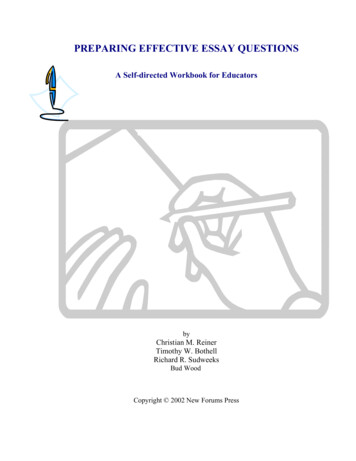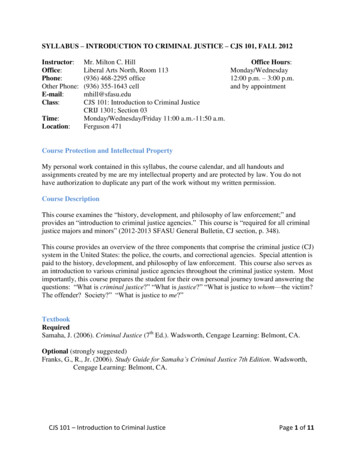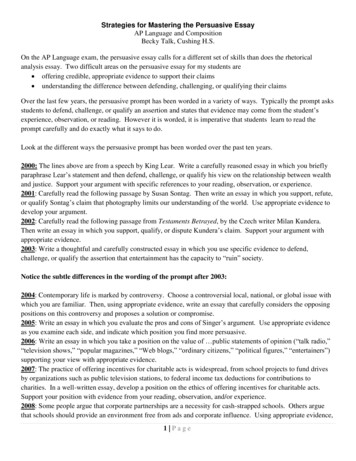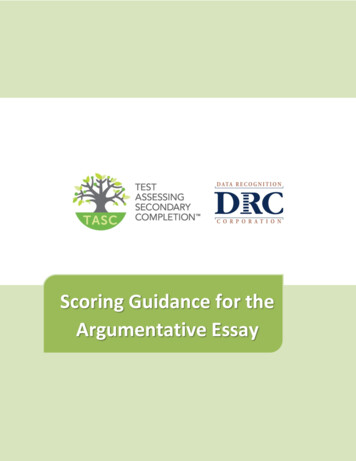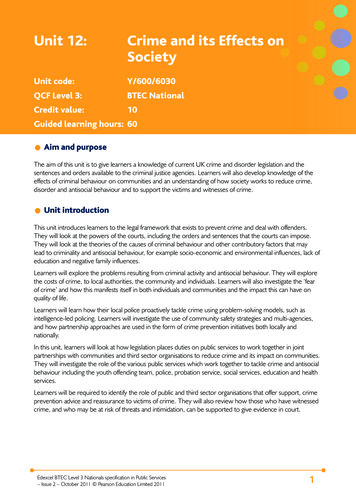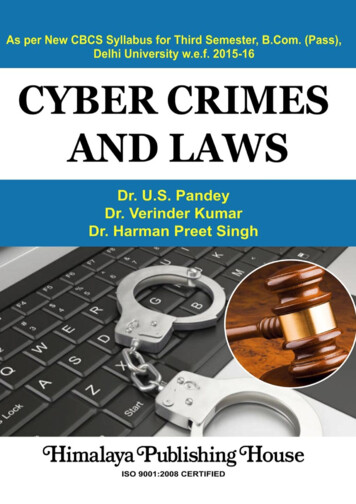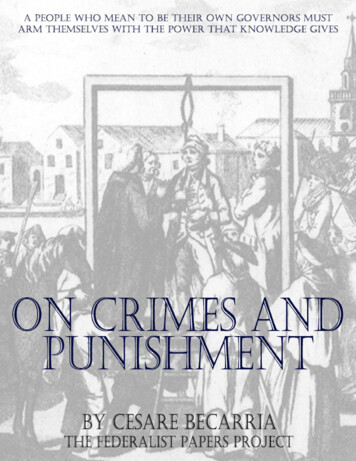
Transcription
AN ESSAY ONCRIME AND PUNISHMENTBy Cesare BecarriaThe Federalist Papers Projectwww.thefederalistpapers.org
An Essay on Crime and Punishment by Cesare BecarriaTable of ContentsPREFACE OF THE TRANSLATOR. . 5INTRODUCTION. . 7AN ESSAY ON CRIMES AND PUNISHMENTS. . 9OF THE ORIGIN OF PUNISHMENTS. . 9OF THE RIGHT TO PUNISH. . 9CONSEQUENCES OF THE FOREGOING PRINCIPLES. . 10OF THE INTERPRETATION OF LAWS. . 11OF THE OBSCURITY OF LAWS. . 12OF THE PROPORTION BETWEEN CRIMES AND PUNISHMENTS. . 13OF ESTIMATING THE DEGREE OF CRIMES. . 15OF THE DIVISION OF CRIMES. . 16OF HONOUR. . 17OF DUELLING. . 18OF CRIMES WHICH DISTURB THE PUBLIC TRANQUILLITY. . 19OF THE INTENT OF PUNISHMENTS. . 20OF THE CREDIBILITY OF WITNESSES. . 20OF EVIDENCE AND THE PROOFS OF A CRIME, AND OF THE FORM OF JUDGMENT. . 21OF SECRET ACCUSATIONS. . 23OF TORTURE. . 24OF PECUNIARY PUNISHMENTS. . 27OF OATHS. . 28OF THE ADVANTAGE OF IMMEDIATE PUNISHMENT. . 29OF ACTS OF VIOLENCE. . 30OF THE PUNISHMENT OF THE NOBLES. . 31OF ROBBERY. . 32OF INFAMY, CONSIDERED AS A PUNISHMENT. . 32OF IDLENESS. . 33www.thefederalistpapers.orgPage 2
An Essay on Crime and Punishment by Cesare BecarriaOF BANISHMENT, AND CONFISCATION. . 33OF THE SPIRIT OF FAMILY IN STATES. . 34OF THE MILDNESS OF PUNISHMENTS. . 36OF THE PUNISHMENT OF DEATH. . 37OF IMPRISONMENT. 41OF PROSECUTION AND PRESCRIPTION. . 42OF CRIMES OF DIFFICULT PROOF. . 44OF SUICIDE. . 46OF SMUGGLING. . 48OF BANKRUPTS. . 48OF SANCTUARIES. . 50OF REWARDS FOR APPREHENDING, OR KILLING CRIMINALS. . 51OF ATTEMPTS. ACCOMPLICES AND PARDON. . 51OF SUGGESTIVE INTERROGATIONS. . 52OF A PARTICULAR KIND OF CRIMES. . 53OF FALSE IDEAS OF UTILITY. . 53OF THE MEANS OF PREVENTING CRIMES. . 54OF THE SCIENCES. . 55OF MAGISTRATES. . 57OF REWARDS. . 57OF EDUCATION. 57OF PARDONS. . 58CONCLUSION. . 59A COMMENTARY ON THE BOOK OF CRIMES AND PUNISHMENTS. . 59THE OCCASION OF THIS COMMENTARY. . 59OF PUNISHMENTS. . 60ON THE PUNISHMENT OF HERETICS. . 60ON THE EXTIRPATION OF HERESY. . 62OF PROFANATION. . 63www.thefederalistpapers.orgPage 3
An Essay on Crime and Punishment by Cesare BecarriaOF THE INDULGENCE OF THE ROMANS IN MATTERS OF RELIGION. . 65ON THE CRIME OF PREACHING; AND OF ANTHONY. . 66THE HISTORY OF SIMON MORIN. . 67OF WITCHES. . 69ON THE PUNISHMENT OF DEATH. . 70ON DEATH WARRANTS. . 71ON TORTURE. . 71OF CERTAIN SANGUINARY TRIBUNALS. . 72ON THE DIFFERENCE BETWEEN POLITICAL AND NATURAL LAWS. . 73ON THE CRIME OF HIGH-TREASON. ON TITUS OATES, AND ON THE DEATH OF AUGUSTIN DE THOU. 74OF RELIGIOUS CONFESSION. . 76OF FALSE MONEY. . 77ON DOMESTIC THEFT. . 78ON SUICIDE. . 78ON A CERTAIN SPECIES OF MUTILATION. . 79ON CONFISCATION. . 80ON CRIMINAL PROCEDURE, AND OTHER FORMS. . 81THE IDEA OF REFORMATION. 83www.thefederalistpapers.orgPage 4
An Essay on Crime and Punishment by Cesare BecarriaPREFACE OF THE TRANSLATOR.Penal Laws, so considerable a part of every system of legislation, and of so great importance tothe happiness, peace and security of every member of society, are still so imperfect, and areattended with so many unnecessary circumstances of cruelty in all nations, that an attempt toreduce them to the standard of reason must be interesting to all mankind. It is not surprising then,that this little book hath engaged the attention of all ranks of people in every part of Europe. It isnow about eighteen months since the first publication; in which time it hath passed no less thansix editions in the original language; the third of which was printed within six months after itsfirst appearance. It hath been translated into French; that translation hath also been several timesreprinted, and perhaps no book, on any subject, was ever received with more avidity, moregenerally read, or more universally applauded.The author is the Marquis Beccaria, of Milan. Upon considering the nature of the religion andgovernment under which he lives, the reasons for concealing his name are obvious. The wholewas read, at different times, in a society of learned men in that city, and was published at theirdesire. As to the translation, I have preserved the order of the original, except in a paragraph ortwo, which I have taken the liberty to restore to the chapters to which they evidently belong, andfrom which they must have been accidentally detached. The French translator hath gone muchfarther; he hath not only transposed every chapter, but every paragraph in the whole book. But inthis, I conceive he hath assumed a right which belongs not to any translator, and which cannot bejustified. His disposition may appear more systematical, but certainly the author has asundoubted a right to the arrangement of his own ideas as to the ideas themselves; and thereforeto destroy that arrangement, is to pervert his meaning, if he had any meaning in his plan, thecontrary to which can hardly be supposed.With regard to the Commentary, attributed to Mons. de Voltaire, my only authority forsupposing it his, is the voice of the public, which indeed is the only authority we have for mostof his works. Let those who are acquainted with the peculiarity of his manner judge forthemselves.The facts above mentioned would preclude all apology for this translation, if any apology werenecessary, for translating into our language a work, which, from the nature of the subject, mustbe interesting to every nation; but must be particularly acceptable to the English, from theeloquent and forcible manner in which the author pleads the cause of liberty, benevolence andhumanity. It may however be objected, that a treatise of this kind is useless in England, where,from the excellence of our laws and government, no examples of cruelty or oppression are to befound. But it must also be allowed, that much is still wanting to perfect our system of legislation;the confinement of debtors, the filth and horror of our prisons, the cruelty of jailors, and theextortion of the petty officers of justice, to all which may be added the melancholy reflection,that the number of criminals put to death in England is much greater than in any other part ofEurope, are considerations which will sufficiently answer every objection. These are my onlyreasons for endeavouring to diffuse the knowledge of the useful truths contained in this littlewww.thefederalistpapers.orgPage 5
An Essay on Crime and Punishment by Cesare Becarriaessay; and I say, with my author, that if I can be instrumental in rescuing a single victim from thehand of tyranny or ignorance, his transports will sufficiently console me for the contempt of allmankind.www.thefederalistpapers.orgPage 6
An Essay on Crime and Punishment by Cesare BecarriaINTRODUCTION.In every human society, there is an effort continually tending to confer on one part the height ofpower and happiness, and to reduce the other to the extreme of weakness and misery. The intentof good laws is to oppose this effort, and to diffuse their influence universally and equally. Butmen generally abandon the care of their most important concerns to the uncertain prudence anddiscretion of those, whose interest it is to reject the best and wisest institutions; and it is not tillthey have been led into a thousand mistakes, in matters the most essential to their lives andliberties, and are weary of suffering, that they can be induced to apply a remedy to the evils withwhich they are oppressed. It is then they begin to conceive, and acknowledge the most palpabletruths, which, from their very simplicity, commonly escape vulgar minds, incapable of analysingobjects, accustomed to receive impressions without distinction, and to be determined rather bythe opinions of others, than by the result of their own examination.If we look into history we shall find that laws which are, or ought to be, conventions betweenmen in a state of freedom, have been, for the most part, the work of the passions of a few, or theconsequences of a fortuitous or temporary necessity; not dictated by a cool examiner of humannature, who knew how to collect in one point the actions of a multitude, and had this only end inview, the greatest happiness of the greatest number. Happy are those few nations who have notwaited till the slow succession of human vicissitudes should, from the extremity of evil, producea transition to good; but, by prudent laws, have facilitated the progress from one to the other!And how great are the obligations due from mankind to that philosopher, who, from theobscurity of his closet, had the courage to scatter among the multitude the seeds of useful truths,so long unfruitful!The art of printing has diffused the knowledge of those philosophical truths, by which therelations between sovereigns and their subjects, and between nations, are discovered. By thisknowledge commerce is animated, and there has sprung up a spirit of emulation and industryworthy of rational beings. These are the produce of this enlightened age; but the cruelty ofpunishments, and the irregularity of proceeding in criminal cases, so principal a part of thelegislation, and so much neglected throughout Europe, has hardly ever been called in question.Errors, accumulated through many centuries, have never been exposed by ascending to generalprinciples; nor has the force of acknowledged truths been ever opposed to the unboundedlicentiousness of ill-directed power, which has continually produced so many authorizedexamples of the most unfeeling barbarity. Surely, the groans of the weak, sacrificed to the cruelignorance and indolence of the powerful; the barbarous torments lavished and multiplied withuseless severity, for crimes either not proved, or in their nature impossible; the filth and horrorsof a prison, increased by the most cruel tormentor of the miserable, uncertainty, ought to haveroused the attention of those, whose business is to direct the opinions of mankind.The immortal Montesquieu has but slightly touched on this subject. Truth, which is eternally thesame, has obliged me to follow the steps of that great man; but the studious part of mankind, forwhom I write, will easily distinguish the superstructure from the foundation. I shall be happy, if,www.thefederalistpapers.orgPage 7
An Essay on Crime and Punishment by Cesare Becarriawith him, I can obtain the secret thanks of the obscure and peaceful disciples of reason andphilosophy, and excite that tender emotion, in which sensible minds sympathise with him whopleads the cause of humanity.www.thefederalistpapers.orgPage 8
An Essay on Crime and Punishment by Cesare BecarriaAN ESSAY ON CRIMES AND PUNISHMENTS.CHAPTER I.OF THE ORIGIN OF PUNISHMENTS.Laws are the conditions under which men, naturally independent, united themselves in society.Weary of living in a continual state of war, and of enjoying a liberty which became of littlevalue, from the uncertainty of its duration, they sacrificed one part of it to enjoy the rest in peaceand security. The sum of all these portions of the liberty of each individual constituted thesovereignty of a nation; and was deposited in the hands of the sovereign, as the lawfuladministrator. But it was not sufficient only to establish this deposit; it was also necessary todefend it from the usurpation of each individual, who will always endeavour to take away fromthe mass, not only his own portion, but to encroach on that of others. Some motives, therefore,that strike the senses, were necessary to prevent the despotism of each individual from plungingsociety into its former chaos. Such motives are the punishment established against the infractorsof the laws. I say that motives of this kind are necessary; because experience shews that, themultitude adopt no established rules of conduct; and because, society is prevented fromapproaching to that dissolution (to which, as well as all other parts of the physical and moralworld, it naturally tends) only by motives that are the immediate objects of sense, and which,being continually presented to the mind, are sufficient to counterbalance the effects of thepassions of the individual which oppose the general good. Neither the power of eloquence, northe sublimest truths, are sufficient to restrain, for any length of time, those passions which areexcited by the lively impression of present objects.CHAPTER II.OF THE RIGHT TO PUNISH.Every punishment which does not arise from absolute necessity, says the great Montesquieu, istyrannical. A proposition which may be made more general, thus. Every act of authority of oneman over another, for which there is not an absolute necessity, is tyrannical. It is upon this, then,that the sovereign’s right to punish crimes is founded; that is, upon the necessity of defending thepublic liberty, intrusted to his care, from the usurpation of individuals; and punishments are justin proportion as the liberty, preserved by the sovereign, is sacred and valuable.Let us consult the human heart, and there we shall find the foundation of the sovereign’s right topunish; for no advantage in moral policy can be lasting, which is not founded on the indeliablesentiments of the heart of man. Whatever law deviates from this principle will always meet witha resistance, which will destroy it in the end; for the smallest force, continually applied, willovercome the most violent motion communicated to bodies.www.thefederalistpapers.orgPage 9
An Essay on Crime and Punishment by Cesare BecarriaNo man ever gave up his liberty merely for the good of the public. Such a chimera exists only inromances. Every individual wishes, if possible, to be exempt from the compacts that bind the restof mankind.The multiplication of mankind, though slow, being too great for the means which the earth, in itsnatural state, offered to satisfy necessities, which every day became more numerous, obligedmen to separate again, and form new societies. These naturally opposed the first, and a state ofwar was transferred from individuals to nations.Thus it was necessity that forced men to give up a part of their liberty; it is certain, then, thatevery individual would chuse to put into the public stock the smallest portion possible; as muchonly as was sufficient to engage others to defend it. The aggregate of these, the smallest portionspossible, forms the right of punishing: all that extends beyond this is abuse, not justice.Observe, that by justice I understand nothing more than that bond, which is necessary to keep theinterest of individuals united; without which, men would return to the original state of barbarity.All punishments, which exceed the necessity of preserving this bond, are in their nature unjust.We should be cautious how we associate with the word justice, an idea of anything real, such asa physical power, or a being that actually exists. I do not, by any means, speak of the justice ofGod, which is of another kind, and refers immediately to rewards and punishments in a life tocome.CHAPTER III.CONSEQUENCES OF THE FOREGOING PRINCIPLES.The laws only can determine the punishment of crimes; and the authority of making penal lawscan only reside with the legislator, who represents the whole society united by the socialcompact. No magistrate then, (as he is one of the society,) can, with justice, inflict on any othermember of the same society, punishment that is not ordained by the laws. But as a punishment,increased beyond the degree fixed by the law, is the just punishment, with the addition ofanother; it follows, that no magistrate, even under a pretence of zeal, or the public good, shouldincrease the punishment already determined by the laws.If every individual be bound to society, society is equally bound to him by a contract, which,from its nature, equally binds both parties. This obligation, which descends from the throne tothe cottage, and equally binds the highest and lowest of mankind, signifies nothing more, thanthat it is the interest of all, that conventions, which are useful to the greatest number, should bepunctually observed. The violation of this compact by any individual, is an introduction toanarchy.The sovereign, who represents the society itself, can only make general laws to bind themembers; but it belongs not to him to judge whether any individual has violated the socialwww.thefederalistpapers.orgPage 10
An Essay on Crime and Punishment by Cesare Becarriacompact, or incurred the punishment in consequence. For in this case there are two parties, onerepresented by the sovereign, who insists upon the violation of the contract, and the other is theperson accused, who denies it. It is necessary then that there should be a third person to decidethis contest; that is to say, a judge, or magistrate, from whose determination there should be noappeal; and this determination should consist of a simple affirmation, or negation of fact.If it can only be proved, that the severity of punishments, though not immediately contrary to thepublic good, or to the end for which they were intended, viz., to prevent crimes, be useless; thensuch severity would be contrary to those beneficent virtues, which are the consequence ofenlightened reason, which instructs the sovereign to wish rather to govern men in a state offreedom and happiness, than of slavery. It would also be contrary to justice, and the socialcompact.CHAPTER IV.OF THE INTERPRETATION OF LAWS.Judges, in criminal cases, have no right to interpret the penal laws, because they are notlegislators. They have not received the laws from our ancestors as a domestic tradition, or as thewill of a testator, which his heirs and executors are to obey; but they receive them from a societyactually existing, or from the sovereign, its representative. Even the authority of the laws is notfounded on any pretended obligation, or ancient convention; which must be null, as it cannotbind those who did not exist at the time of its institution; and unjust, as it would reduce men, inthe ages following, to a herd of brutes, without any power of judging or acting. The laws receivetheir force and authority from an oath of fidelity, either tacit or expressed, which living subjectshave sworn to their sovereign, in order to restrain the intestine fermentation of the privateinterests of individuals. From hence springs their true and natural authority. Who then is theirlawful interpreter? The sovereign, that is, the representative of society, and not the judge, whoseoffice is only to examine, if a man have or have not, committed an action contrary to the laws.In every criminal cause the judge should reason syllogistically. The major should be the generallaw; the minor the conformity of the action, or its opposition to the laws; the conclusion, libertyor punishment. If the judge be obliged by the imperfection of the laws, or chuses to make anyother, or more syllogisms than this, it will be an introduction to uncertainty.There is nothing more dangerous than the common axiom: the spirit of the laws is to beconsidered. To adopt it is to give way to the torrent of opinions. This may seem a paradox tovulgar minds, which are more strongly affected by the smallest disorder before their eyes, thanby the most pernicious, though remote, consequences produced by one false principle adopted bya nation.Our knowledge is in proportion to the number of our ideas. The more complex these are, thegreater is the variety of positions in which they may be considered. Every man hath his ownwww.thefederalistpapers.orgPage 11
An Essay on Crime and Punishment by Cesare Becarriaparticular point of view, and at different times sees the same objects in very different lights. Thespirit of the laws will then be the result of the good or bad logic of the judge; and this willdepend on his good or bad digestion; on the violence of his passions; on the rank and conditionof the abused, or on his connections with the judge; and on all those circumstances which changethe appearance of objects in the fluctuating mind of man. Hence we see the fate of a delinquentchanged many times in passing through the different courts of judicature, and his life and libertyvictims to the false ideas or ill humour of the judge; who mistakes the vague result of his ownconfused reasoning, for the just interpretation of the laws. We see the same crimes punished in adifferent manner at different times in the same tribunals; the consequence of not havingconsulted the constant and invariable voice of the laws, but the erring instability of arbitraryinterpretation.The disorders that may arise from a rigorous observance of the letter of penal laws, are not to becompared with those produced by the interpretation of them. The first are temporaryinconveniencies, which will oblige the legislator to correct the letter of the law, the want ofpreciseness and uncertainty of which has occasioned these disorders; and this will put a stop tothe fatal liberty of explaining; the source of arbitrary and venal declamations. When the code oflaws is once fixed, it should be observed in the literal sense, and nothing more is left to the judgethan to determine, whether an action be, or be not, conformable to the written law. When the ruleof right, which ought to direct the actions of the philosopher as well as the ignorant, is a matterof controversy, not of fact, the people are slaves to the magistrates. The despotism of thismultitude of tyrants is more insupportable, the less the distance is between the oppressor and theoppressed; more fatal than that of one, for the tyranny of many is not to be shaken off, but byhaving recourse to that of one alone. It is more cruel, as it meets with more opposition, and thecruelty of a tyrant is not in proportion to his strength, but to the obstacles that oppose him.These are the means by which security of person and property is best obtained; which is just, asit is the purpose of uniting in society; and it is useful, as each person may calculate exactly theinconveniencies attending every crime. By these means subjects will acquire a spirit ofindependence and liberty; however it may appear to those who dare to call the weakness ofsubmitting blindly to their capricious and interested opinions by the sacred name of virtue.These principles will displease those who have made it a rule with
undoubted a right to the arrangement of his own ideas as to the ideas themselves; and therefore to destroy that arrangement, is to pervert his meaning, if he had any meaning in his plan, the contrary to which can hardly be supposed. With regard to the Commentary, attributed to Mons. de Voltaire, my only authority for




